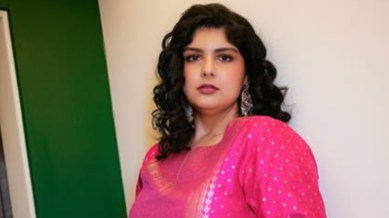📣 For more lifestyle news, click here to join our WhatsApp Channel and also follow us on Instagram
‘It became more apparent after Janhvi was born’: What Anshula Kapoor’s childhood reveals about why kids often blame themselves for their parents’ separation
Anshula also shared, “As a 6-year-old, I just thought that before I came into their lives, everything was hunky-dory. When I came into their life, they suddenly didn't belong together anymore.”

Growing up in a family undergoing separation is never easy, especially for a child still trying to understand the world.
Actor and entrepreneur Anshula Kapoor, daughter of producer Boney Kapoor and late television producer Mona Shourie, recently opened up about how her parents’ separation shaped her childhood. In a conversation with Pinkvilla, Anshula reflected on the emotional complexities she faced as a young child, revealing that she often internalised the blame for their divorce. “I have good memories of my childhood, but I’m also aware of how I had to grow up much sooner than my contemporaries and my friends. Because it was not a normal childhood,” she said.
Anshula also shared, “As a 6-year-old, I just thought that before I came into their lives, everything was hunky-dory. When I came into their life, they suddenly didn’t belong together anymore. Maybe I was not a good enough daughter.” She admitted these feelings intensified after the birth of her half-sister, Janhvi Kapoor. She said, “It became more apparent after Janu (Janhvi) was born. I was like, maybe something was wrong with me… I only went wrong.”
While she now understands it wasn’t her fault — “Of course it’s not. Both my parents have explained it. And I do not believe it anymore” — Anshula’s experience raises more profound questions about how children process parental separation and self-worth.
Is it common for children to blame themselves for their parents’ divorce, and what are the psychological effects of this kind of self-blame?
Gurleen Baruah, existential psychotherapist at That Culture Thing, tells indianexpress.com, “Yes, it’s sadly quite common — especially in younger children. At that age, a child’s emotional and cognitive world is still forming, and they tend to view events through an egocentric lens: ‘If something bad happened, maybe it’s because of me.’ They’re trying to make sense of the rupture with limited tools. This kind of internalised guilt can quietly shape their sense of self-worth, leaving behind beliefs like ‘I’m not lovable’ or ‘I ruin things,’ which may later manifest as perfectionism, people-pleasing, or fear of abandonment. When unaddressed, these early meanings can calcify into long-term identity wounds.”
How does the birth of a half-sibling during or after a separation influence the emotional dynamics for a child?
The arrival of a new sibling, especially a half-sibling, during or shortly after a separation, can evoke complex emotions. “The child might feel displaced, fearing they’ve been replaced or that the caregiver’s love now belongs to someone else. Even if no one says it out loud, children can interpret the shift as abandonment, or as confirmation that they weren’t ‘enough’ to keep the family together. Jealousy, sadness, or withdrawal are not signs of pettiness but signs of emotional overwhelm, especially when the child is still trying to make sense of loss,” notes Baruah.
What can parents do to help children avoid internalising guilt or feelings of inadequacy?
Children need age-appropriate, emotionally honest conversations that reassure them the separation is not their fault. It’s essential to stay present, even if co-parenting from separate homes.
“Kids don’t need perfection — they need attunement. Understand that tantrums, rebellion, or silence may not be disobedience, but distress. Instead of shutting it down, stay close. Keep showing up. Let them know they are still deeply loved, chosen, and safe. This steady presence, even when everything else feels unstable, is what slowly helps children rewrite the stories they tell themselves,” concludes Baruah.
📣 For more lifestyle news, click here to join our WhatsApp Channel and also follow us on Instagram